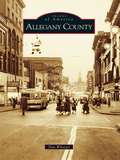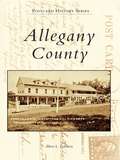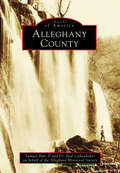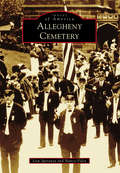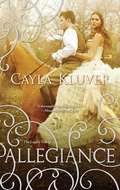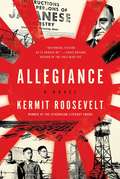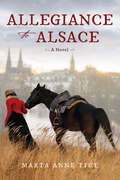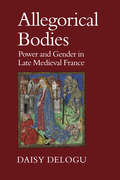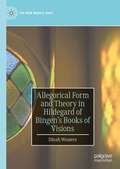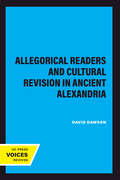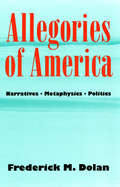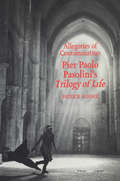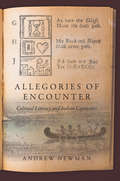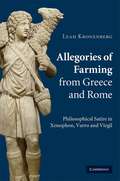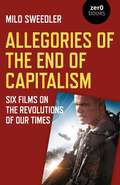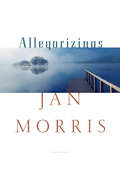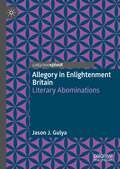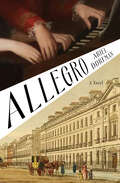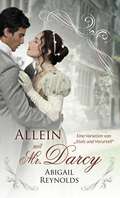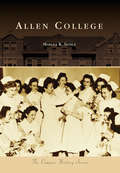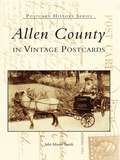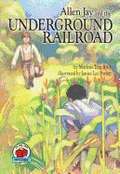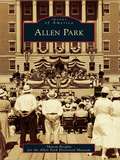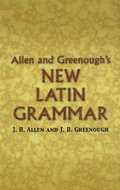- Table View
- List View
Allegany County
by Dan WhetzelAllegany County's historical significance covers a broad range of topics and years. Established in 1789, the county rapidly developed in the 19th century due to transportation advantages, industrialization, natural resources, and the entrepreneurial spirit of its citizens. Allegany County's economy continued to expand in the 20th century, as additional industries made western Maryland their home. Industrial growth created towns and commercial opportunities that have shaped the county's character for more than two centuries.
Allegany County (Postcard History Series)
by Albert L. FeldsteinAllegany County was established in 1789 and is truly one of America's historic transportation and industrial centers. The images presented here portray this heritage and were selected with care from the author's collection of several thousand postcards. The book features Allegany's towns and communities, downtown business scenes, residential areas, industries, historic buildings, churches, schools, hospitals, floods, parades, coal mining, railroad stations, and historic and natural landmarks. In some cases, the personal messages sent on the back of the postcards are included.
Alleghany County (Images of America)
by Alleghany Historical Society Dr Paul Linkenhoker Samuel Hale IIAlleghany County was formed in 1822 from parts of Botetourt, Bath, and Monroe Counties. The area was settled in 1746, and by the early part of the 19th century, a number of settlements and large farms were operating locally. Covington, Clifton Forge, Iron Gate, Longdale, Selma, Low Moor, and other small communities developed, and the natural resources in the area led to the establishment of several industrial operations. The railroad came to Selma in 1857, and after the Civil War, the Chesapeake & Ohio Railroad was completed to Huntington, West Virginia. The abundance of timber, rich deposits of iron ore, and accessibility to rails, rivers, and streams contributed to industrial growth. Brickyards, lumber mills, tanneries, iron smelters, and agricultural operations attracted other businesses and industries, bringing rapid growth to the area. In Covington, the West Virginia Pulp and Paper Company built a mill in 1899. Ever since, the company has served as the county's economic mainstay.
Allegheny Cemetery (Images of America)
by Lisa Speranza Nancy FoleyIt is easy to look at a place such as Allegheny Cemetery in Pittsburgh's Lawrenceville neighborhood and think that it encompasses strictly the dead. But a closer look reveals many lives and stories told throughout the pages of time by those who have lived them. To define Allegheny Cemetery as simply a place does not do it justice. It is not only a physical location, but a crossroads in history, and a point in time where each of these lives converge. Images of America: Allegheny Cemetery shares these legacies with the hope that present and future generations will do the same.
Allegiance
by Cayla KluverHe couldn't help his past any more than he could help the way those intense, deep blue eyes pierced me and held me captive.An eighteen-year-old queen in love with the enemy as their countries pass the point of no return...Bound to a man she cannot love, Queen Alera of Hytanica must forget Narian, the young man who holds her heart. For Narian is destined to conquer Hytanica at the behest of his master, the powerful magic-user known as the Overlord. Alera doesn't truly believe Narian will fight against Hytanica-until Cokyrian troops attack with Narian commanding the charge.Faced with the greatest betrayal a heart can know, Alera must set aside personal feelings and lead her kingdom through its darkest time. And when all hope, will and courage seem lost, she must find strength and remember that even the blackest night must have a dawn....
Allegiance
by Kermit RooseveltA sophisticated legal thriller that plunges readers into the debate within the US government surrounding the imprisonment of thousands of Japanese-Americans during World War II.When the news broke about the Japanese attack on Pearl Harbor, Caswell "Cash" Harrison was all set to drop out of law school and join the army... until he flunked the physical. Instead, he's given the opportunity to serve as a clerk to Supreme Court Justice Hugo Black. He and another clerk stumble onto a potentially huge conspiracy aimed at guiding the court's interests, and the cases dealing with the constitutionality of the prison camps created to detain Japanese-Americans seem to play a key part. Then Cash's colleague dies under mysterious circumstances, and the young, idealistic lawyer is determined to get at the truth. His investigation will take him from the office of J. Edgar Hoover to an internment camp in California, where he directly confronts the consequences of America's wartime policies. Kermit Roosevelt combines the momentum of a top-notch legal thriller with a thoughtful examination of one of the worst civil rights violations in US history in this long-awaited follow-up to In the Shadow of the Law.ce during war...
Allegiance to Alsace
by Marta Anne Tice"This is a fast moving read with well documented history.The year is 1805. Napoleon Bonaparte is rampaging Europe for domination, threatening the eastern regions of Germany. Annaelise Theiss is the daughter of a German winemaker, Count Karl Theiss, and of a former Parisian aristocrat, Louisa Guerlain. The young heroine is torn between her mother’s allegiance to the new French Regime and her father’s thinking influenced by the Enlightenment from German philosophers and the American Founding Fathers. Espionage against the Emperor is everywhere.As a young ingenue, Annaelise witnesses conflicting messages. She experiences the former glory of the French aristocracy while visiting a distant cousin in Bavaria with her family. When coming of age, her heart becomes clouded in deception and mystery. Her journey takes her further from the winery and brewery lifestyle in Alsace-Lorraine, to her father’s family vineyard home in the Pfalz, Germany. It is there that she connects with her German heritage and lifestyle. The plot takes a new twist when she falls in love with a courageous French officer, Captain Hans Roster. From ballrooms to battle scenes, this spellbinding story will keep you engaged with each chapter.“. . . Readers will easily become attached to Annaelise and feel her joy and her sorrow as she lives through one of the most fascinating periods in history. If you are an avid reader of historical romance novels, you will love Allegiance to Alsace.”– JOANNE DIMAGGIO, MA, CHT, author of Soul Writing: Conversing with your Higher Self“On a visit to the Pfalz in Germany and the Alsace-Lorraine region of France as a young girl, Marta Anne Tice had a vivid déjà vu experience of living in the eighteenth and nineteenth century. So it comes as no surprise that her novel brilliantly recreates the sparkling pageantry and powerful history of the Napoleonic era of that bygone time. A wonderful read!”– STEFAN BECHTEL, author of Through a Glass, Darkly and Mr. Hornaday’s WarThe author’s information and book trailer can be found on: www.martaatice.comContact the author through BQB or through her email: martaleapoffaith@gmail.com "
Allegorical Bodies
by Daisy DeloguAllegorical Bodies begins with the paradoxical observation that at the same time as the royal administrators of late fourteenth and early fifteenth-century France excluded women from the royal succession through the codification of Salic law, writers of the period adopted the female form as the allegorical personification of France itself. Considering the role of female allegorical figures in the works of Eustache Deschamps, Christine de Pizan, and Alain Chartier, as well as in the sermons of Jean Gerson, Daisy Delogu reveals how female allegories of the Kingdom of France and the University of Paris were used to conceptualize, construct, and preserve structures of power during the tumultuous reign of the mad king Charles VI (1380-1422).An impressive examination of the intersection between gender, allegory, and political thought, Delogu's book highlights the importance of gender to the functioning of allegory and to the construction of late medieval French identity.
Allegorical Form and Theory in Hildegard of Bingen’s Books of Visions (The New Middle Ages)
by Dinah WoutersThis book analyses how the three books of visions by Hildegard of Bingen use the allegorical vision as a form of knowledge. It describes how the visionary’s use of allegory and allegorical exegesis is linked to theories of cognition, interpretation, and prophecy. It argues that the form of the allegorical vision is not just the product of a medieval symbolic mentality, but specific to Hildegard’s position and the major transformations taking place in the prescholastic intellectual milieu, such as the changing use of Scripture or the shift from traditional hermeneutics to cognitive language philosophy. The book shows that Hildegard uses traditional forms of knowledge – prophecy, the vision, monastic theology, allegorical hermeneutics – in startlingly innovative ways by combining them and by revising them for her own time.
Allegorical Readers and Cultural Revision in Ancient Alexandria
by David DawsonAllegorical readings of literary or religious texts always begin as counterreadings, starting with denial or negation, challenging the literal sense: "You have read the text this way, but I will read it differently." David Dawson insists that ancient allegory is best understood not simply as a way of reading texts, but as a way of using non-literal readings to reinterpret culture and society. Here he describes how some ancient pagan, Jewish, and Christian interpreters used allegory to endorse, revise, and subvert competing Christian and pagan world views.This reassessment of allegorical reading emphasizes socio-cultural contexts rather than purely formal literary features, opening with an analysis of the pagan use of etymology and allegory in the Hellenistic world and pagan opposition to both techniques. The remainder of the book presents three Hellenistic religious writers who each typify distinctive models of allegorical interpretation: the Jewish exegete Philo, the Christian Gnostic Valentinus, and the Christian Platonist Clement. The study engages issues in the fields of classics, history of Christianity and Hellenistic Judaism, literary criticism and theory, and more broadly, critical theory and cultural criticism.
Allegories of America: Narratives, Metaphysics, Politics (Contestations)
by Frederick M. DolanAllegories of America offers a bold idea of what, in terms of political theory, it means to be American. Beginning with the question What do we want from a theory of politics? Dolan explores the metaphysics of American-ness and stops along the way to reflect on John Winthrop, the Constitution, 1950s behavioralist social science, James Merrill, and William Burroughs.The pressing problem, in Dolan's view, is how to find a vocabulary for politics in the absence of European metaphysics. American political thinkers, he suggests, might respond by approaching their own theories as allegories. The postmodern dilemma of the loss of traditional absolutes would thus assume the status of a national mythology—America's perennial identity crisis in the absence of a tradition establishing the legitimacy of its founding.After examining the mid-Atlantic sermons of John Winthrop, the spiritual founding father, Dolan reflects on the authority of the Constitution and the Federalist. He then takes on questions of representation in Cold War ideology, focusing on the language of David Easton and other liberal political "behaviorists," as well as on cold War cinema and the coverage of international affairs by American journalists. Additional discussions are inspired by Hannah Arendt's recasting of political theory in a narrative framework. here Dolan considers two starkly contrasting postwar literary figures—William S. Burroughs and James Merrill—both of whom have a troubled relationship to politics but nonetheless register an urgent need to articulate its dangers and opportunities. Alongside Merrill's unraveling of the distinction between the serious and the fictive, Dolan assesses the attempt in Arendt's On Revolution to reclaim fictional devices for political reflection.
Allegories of Contamination
by Patrick RumbleThe Trilogia della vita (Trilogy of Life) is a series of three films that Pier Paolo Pasolini completed before his horrifying assassination in 1975, and it remains among the most controversial of his cinematic works. In Allegories of Contamination Patrick Rumble provides an incisive critical and theoretical study of these films and the Marxist filmmaker's complex, original concept of the cinematic medium.With the three films that make up the Trilogy of Life - The Decameron, Canterbury Tales, and The Arabian Nights - Pasolini attempts to recapture the aura surrounding popular, predominantly oral forms of storytelling through a pro-modern vision of innocent, unalienated bodies and pleasures. In these works Pasolini appears to abandon the explicitly political engagement that marked his earlier works - films that led him to be identified with other radical filmmakers such as Bellocchio, Bertolucci, and Godard. However, Pasolini insisted that these were his 'most ideological films,' and his political engagement translates into a mannerist, anti-classical style or what he called a 'cinema of poetry.' Rumble offers a comparative study based on the concept of 'aesthetic contamination,' which is fundamental to the understanding of Pasolini's poetics. Aesthetic contamination concerns the mediation between different cultures and different historical moments. Through stylistic experimentation, the Trilogy of Life presents a genealogy of visual codes, an interrogation of the subjectivity of narrative cinema. In these films Pasolini celebrates life, and perhaps therein lies their simple heresy.
Allegories of Encounter: Colonial Literacy and Indian Captivities (Published by the Omohundro Institute of Early American History and Culture and the University of North Carolina Press)
by Andrew NewmanPresenting an innovative, interdisciplinary approach to colonial America's best-known literary genre, Andrew Newman analyzes depictions of reading, writing, and recollecting texts in Indian captivity narratives. While histories of literacy and colonialism have emphasized the experiences of Native Americans, as students in missionary schools or as parties to treacherous treaties, captivity narratives reveal what literacy meant to colonists among Indians. Colonial captives treasured the written word in order to distinguish themselves from their Native captors and to affiliate with their distant cultural communities. Their narratives suggest that Indians recognized this value, sometimes with benevolence: repeatedly, they presented colonists with books.In this way and others, Scriptures, saintly lives, and even Shakespeare were introduced into diverse experiences of colonial captivity. What other scholars have understood more simply as textual parallels, Newman argues instead may reflect lived allegories, the identification of one's own unfolding story with the stories of others. In an authoritative, wide-ranging study that encompasses the foundational New England narratives, accounts of martyrdom and cultural conversion in New France and Mohawk country in the 1600s, and narratives set in Cherokee territory and the Great Lakes region during the late eighteenth century, Newman opens up old tales to fresh, thought-provoking interpretations.
Allegories of Farming from Greece and Rome
by Leah KronenbergIn this book Professor Kronenberg shows that Xenophon's Oeconomicus, Varro's De Re Rustica and Virgil's Georgics are not simply works on farming but belong to a tradition of philosophical satire which uses allegory and irony to question the meaning of morality. These works metaphorically connect farming and its related arts to political life; but instead of presenting farming in its traditional guise as a positive symbol, they use it to model the deficiencies of the active life, which in turn is juxtaposed to a preferred contemplative way of life. Although these three texts are not usually treated together, this book convincingly connects them with an original and provocative interpretation of their allegorical use of farming. It also fills an important gap in our understanding of the literary influences on the Georgics by showing that it is shaped not just by its poetic predecessors but by philosophical dialogue.
Allegories of the End of Capitalism: Six Films on the Revolutions of Our Times
by Milo SweedlerIn Allegories of the End of Capitalism, Milo Sweedler deconstructs the events of films Melancholia; Cosmopolis; Suffragette; Django Unchained; Elysium and Snowpiercer, the socio-political contexts they arise from and enter into, and their impact on contemporary culture and life. He examines how filmmakers from six different countries, across four continents, give narrative and audio-visual form to the frustration and anger that burst into public view in 2011, the ongoing class war between the super-rich and the rest of the world's population, and the insurrection that it yet to come.
Allegorizings
by Jan MorrisNew York Times Book Review • Editors' Choice Jan Morris delivers her final volume, brimming with reminiscences, meditations on daily life, and mini-essays on everything from maturity to whistling to Princess Diana. Not so long ago, feeling intimations of mortality, Jan Morris embarked on a wholly novel literary enterprise. What began as a series of high-minded letters to her late daughter—in the style of Lord Chesterfield addressing his son—quickly transformed itself into a potpourri of mini-essays and vibrant reminiscences, organized around experiences both majestic and mundane, from traveling the world with her lifelong partner, Elizabeth, to sneezing and kissing and simply growing old. So Allegorizings came to be, and so Morris decided that it should only be published upon her death, not because she had anything to hide but, merely, in parting. Featuring essays largely written in the early twenty-first century, Allegorizings reflects, above all, Morris’s steadfast conviction that nothing is only what it seems. In fact, she observes, everything is allegory. Indeed, in Morris’s telling, even life—the whole conundrum of existence—is one long, majestically impenetrable allegory. Taking us from the separatist hippie colony of Bolinas, California, to her home country of Wales, and introducing us to Nepalese Sherpas and elderly cruise-goers alike, Morris follows the throughline of allegory throughout her works. In one essay, she lambasts the joylessness of maturity (“Maturity! Did ever a heart thrill to the sound of it, still less the meaning?”) and in another, decries the nonsense of nationality. With characteristic verve, she offers odes to whistling and cursing, cats, and exclamation points. Morris’s travels anchor the collection, as she revisits the iconic settings of her previous works. We join her aboard the storied Orient Express, as well as tube trains passing through the purlieus of London. So too, we hike the foothills of the Himalayas—where Morris burst onto scene with her on-the-spot reportage of the first ascent of Everest—and reflect on the picaresque allure of Tournus, a dichotomized town in France where one France, bearing all the vestiges of privilege, seems to kiss another. Intimate and luminously wise, Allegorizings is as much a testament to the virtues of embracing life as it is a testament to its charming, indignant, and ever-surprising author. In her final work, Morris’s writing is as erudite as ever, conveying a generosity of spirit “flavored by well-earned crankiness” (Vox). Though newly bereft of her company, readers will be reminded what “a good, wise, and witty companion” (Alexander McCall Smith) Morris has been to so many, for so long.
Allegory in Enlightenment Britain: Literary Abominations
by Jason J. GulyaThis Palgrave Pivot argues for the significance of allegory in Enlightenment writing. While eighteenth-century allegory has often been dismissed as an inadequate form, both in its time and in later scholarship, this short book reveals how Enlightenment writers adapted allegory to the cultural changes of the time. It examines how these writers analyzed earlier allegories with scientific precision and broke up allegory into parts to combine it with other genres. These experimentations in allegory reflected the effects of empiricism, secularization and a modern aesthetic that were transforming Enlightenment culture. Using a broad range of examples – including classics of the genre, eighteenth-century texts and periodicals – this book argues that the eighteenth century helped make allegory the flexible, protean literary form it is today.
Allegra: Tra le Strade della Londra Vittoriana
by Eliza Graham1822: La giovane figlia illegittima di Byron muore in un convento in Italia, lontana dalla madre che la adorava. 1838: la giovane Alice Clarke, infelicemente sposata con un uomo violento, è inseguita nelle strade di Londra da un greco e da una donna che indossa un mantello nero.
Allegro: A Novel
by Ariel DorfmanThis thrilling historical mystery starring Mozart tells of friendship and betrayal, and how music allows us to defy death—from the acclaimed author of Death and the Maiden and The Suicide Museum.In 1789 Wolfgang Amadeus Mozart visits the grave of Johann Sebastian Bach in Leipzig, looking for a sign, a signal, an answer to an enigma that has haunted him since childhood: Was Bach murdered by a famous oculist? And years later, was Handel a victim of the same doctor?Allegro follows his investigation, from the salons of London to the streets of Paris, recreating an enthralling and turbulent time, full of rogues and brilliant composers, charlatans and presumptuous nobles. Running parallel to this search is the rise of Mozart, his knowledge and fame, his trials and losses.
Allein mit Mr. Darcy: Eine Variation von „Stolz und Vorurteil“
by Abigail Reynolds Nicola GeigerAllein mit Mr. Darcy... Elizabeth Bennet kann sich nichts Schlimmeres vorstellen, als während eines Schneesturms in einem winzigen Cottage mit dem stolzen und unfreundlichen Mr. Darcy festzusitzen. Dort aber über Tage - und auch Nächte dazu - mit einem verletzten und verwirrten Mr. Darcy gefangen zu sein, der immer wieder die seltsamsten Dinge über sie sagt, ist sogar noch schlimmer. Zumindest besitzt er die nützliche Fähigkeit, ein Feuer zu entfachen, sodass sie sich nicht zu Tode frieren müssen. Als er aber seine Arme um sie legt, findet sie heraus, dass er nicht nur im Kamin ein Feuer entfachen kann. Und das kleine halberfrorene Kätzchen, das er im Holzstoß findet, ist auch keine brauchbare Anstandsdame. Sie nimmt ihm seine Versprechungen, sie zu heiraten, falls jemand etwas darüber herausfindet dass sie zwei Nächte allein verbracht haben, nicht wirklich ab, insbesondere nachdem sie herausfindet, dass er in der Vergangenheit von einer anderen Frau verraten wurde. Als ihre schlimmsten Befürchtungen wahr werden und ihr guter Ruf zerstört ist, wundert es sie nicht, dass sich Mr. Darcy rarmacht und ihr keine andere Wahl lässt, als sich schnellstmöglich einen Ehemann zu suchen, bevor ihre gesamte Familie ruiniert ist. Jeder Gatte wäre nun recht, ganz gleich, wie sehr er ihr wiederstrebt. Auch wenn sie nicht aufhören kann, an Mr. Darcy zu denken. ~*~ Lob für Abigail Reynolds: "Falls Ihnen diese fesselnden und romantischen Pemberley-Variationen nicht bekannt sind: Es handelt sich dabei um Abwandlungen von Stolz und Vorurteil ("Pride and Prejudice"), die unsere geliebten Romanhelden auf einen etwas anderen Weg schicken. Abigail Reynolds, eine meiner liebsten unter den Austen-esken Autorinnen, ist eine talentierte Geschichtenerzählerin, eine glühende Verehrerin von Jane
Allen College (Campus History)
by Marcea K. SeibleIn the early 1920s, Waterloo businessman Henry B. Allen donated $200,000 and 80 acres of land to the Allen Memorial Hospital Association to establish a hospital in memory of Mary, his wife. The hospital opened in 1925 and was operated by the Deaconess Hospital Association of the Evangelical Church. The School of Nursing was founded in 1925, but a lack of resources during the Depression forced the hospital into receivership and the school was closed. Hospital management was assumed by the Lutheran Good Samaritan Society in 1938, and the school reopened in 1942 as the Allen Memorial Hospital Lutheran School of Nursing. In 1989, the school became Allen College of Nursing, a degree-granting institution. Today, as Allen College–UnityPoint Health, it offers an associate degree in radiography; bachelor of science degree in nursing; bachelor of health science degree with majors in diagnostic medical sonography, nuclear medicine technology, medical laboratory science, public health, and dental hygiene; master of science degrees in nursing and occupational therapy; and two doctoral degrees in health professions education and nursing practice. Throughout its 90-year history, Allen College has remained faithful in its mission to prepare health care professionals for their roles in society.
Allen County in Vintage Postcards (Postcard History Series)
by John Martin SmithThe fleeting scenes of Robison Park, Cathedral Square, and Fort Wayne's many parks have often been captured in postcards sent or collected by Allen County's residents and visitors. Captured here in over 200 vintage postcards and images is the history of Allen County, chosen by local merchants, depicting the thriving downtown areas, booming industries, and quiet, pleasant residential sections.Allen County provides a visual 40-year history of Allen County. This vast collection provides a wide range of fascinating images and poignant messages preserved on 1¢ postcards, including the socials, events, buildings, homes, and residents of the past from the towns of Allen County, including Churubusco, Fort Wayne, Grabill, Huntertown, New Haven, Monroeville and Zanesville.
Allen Jay And The Underground Railroad
by Marlene Targ Brill Janice Lee PorterAllen Jay's family farm is a stop on the Underground Railroad. Allen's parents give food and shelter to slaves escaping from the South. One day in 1842, Allen's father asks him to help a runaway slave. Is Allen brave enough? This exciting true story takes you along as Allen meets Henry James, an African American man struggling to find freedom.
Allen Park
by Allen Park Historical Museum Sharon BroglinAllen Park's history begins when Native Americans hunted, fished, and paddled their canoes along the banks of Ecorse Creek. The French were among the earliest settlers, and after the land was cleared, German farmers arrived. Ecorse Township, known today as Downriver, was divided into seven different cities, and Allen Park was born. Once characterized as a "lazy, farming hamlet," Allen Park's residents were the most influential in developing the Village of Allen Park out of Ecorse Township, in 1927, and worked to become the City of Allen Park in 1957. Henry Ford's $5 workday prompted many farmers to sell to developers and go to work for Ford. Hungarians, Poles, Italians, and Armenians moved in, becoming the major ethnic groups within the community. Among the city's celebrities there have been writers, radio and sports personalities, cartoonists, and fashion designers. Towering over the Interstate 94 corridor in Allen Park, the Uniroyal Giant Tire has become an American icon, and although the Veterans Administration medical center is gone, it will forever live in residents' hearts. Enjoy the city's story, gathered from the files of the Allen Park Historical Museum.
Allen and Greenough's New Latin Grammar
by James B Greenough G. L. Kittredge Benj. L. D'Ooge A. A. Howard J. H. AllenA venerable resource for more than a century, Allen and Greenough's New Latin Grammar is still regarded by students and teachers as the finest Latin reference grammar available. Concise, comprehensive, and well organized, it is unrivaled in depth and clarity, placing a wealth of advice on usage, vocabulary, diction, composition, and syntax within easy reach of Latin scholars at all levels. This sourcebook's three-part treatment starts with words and forms, covering parts of speech, declensions, and conjugations. The second part, syntax, explores cases, moods, and tenses. The concluding section offers information on archaic usages, Latin verse, and prose composition, among other subjects. Extensive appendixes feature a glossary of terms and indexes. Students of history, religion, and literature will find lasting value in this modestly priced edition of a classic guide to Latin.
